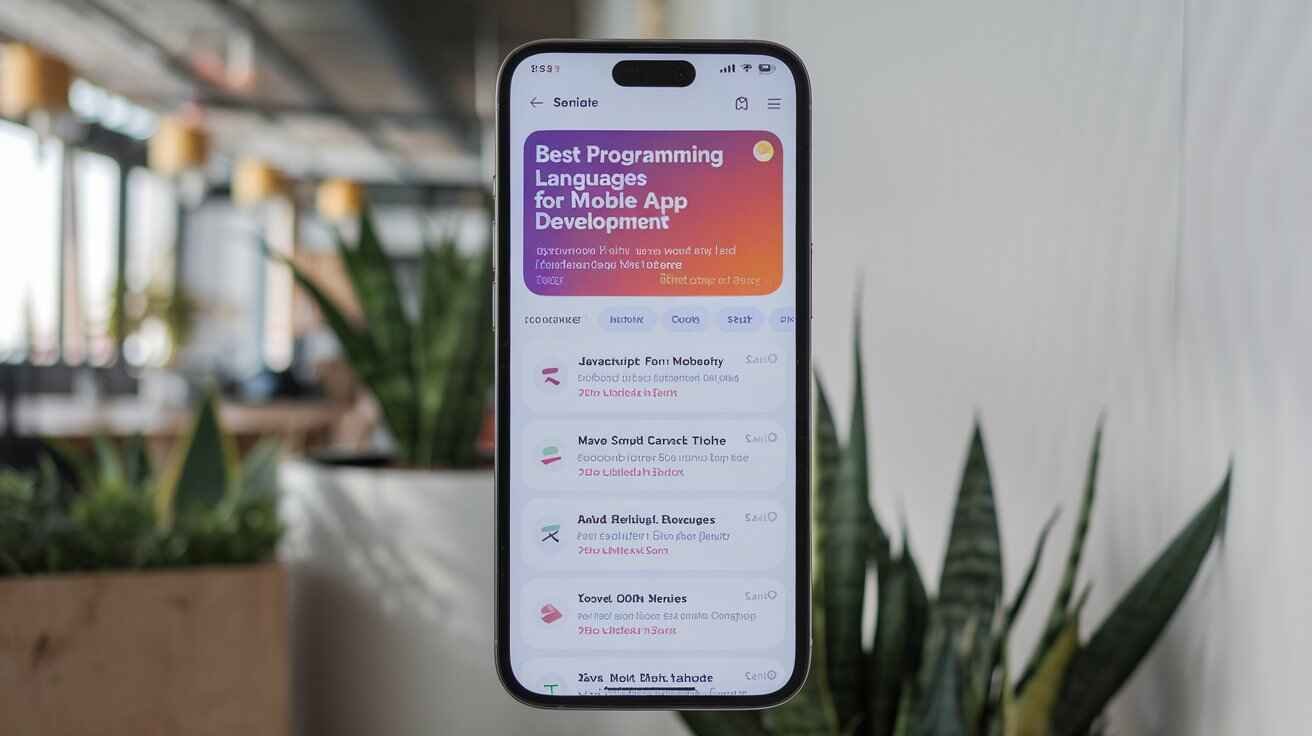The use of mobile applications has continued to grow in society and there are millions of applications developed for various platforms including Android and iOS. Organizations are eager to develop & acquire better-quality apps to reach more people, engage customers and make more sales.
Choosing the best programming language when you are in the process of developing a mobile application is one of the most important decisions you have to make. It determines all these aspects ranging from performance, development speed, long long-term mobile app development costs.
This blog specifically focuses on the programming languages for mobile application development and useful statistics of their advantages.
Why Choosing the Right Programming Language Matters?
Choosing a programming language is one of the basic decisions that define the performance, speed, and expandability of your application. Some languages are more friendly than others for cross-platform applications; some can provide superior performance for native applications.
The right language can also influence the mobile app development services you hire, as different mobile app development companies specialize in various languages.
Top Programming Languages for Mobile App Development
1. JavaScript
JavaScript is one of the most commonly used scripts for web development nowadays, which is mainly used as a client side script. However, with frameworks such as React Native, JavaScript has become one of the preferred languages of mobile application development.
Key Features:
- Cross-platform capabilities: JavaScript, with frameworks like React Native, allows developers to create apps for both Android and iOS using a single codebase.
- Vast developer community: Due to its wide usage, finding JavaScript developers is easier, reducing hiring costs.
- Performance: While JavaScript isn’t the fastest in raw performance compared to native languages, it’s highly efficient for most mobile applications.
Statistics:
- React Native powers about 38% of mobile apps today, making JavaScript a widely used choice for mobile development.
- Over 97.4% of websites use JavaScript on the client side, showcasing its versatility.
Ideal For:
Businesses seeking cost-effective mobile app development services with shorter time-to-market and cross-platform deployment should consider JavaScript.
2. Swift
Swift is the specially created language by Apple for their modern operative system for iOS applications development. It has slowly taken over Objective-C because of the ease of use, safety and efficiency it has shown.
Key Features:
- Speed: Swift is designed for performance, often outperforming its predecessor, Objective-C, and even some scripting languages.
- Safety: Swift reduces common coding errors thanks to its strong typing system and memory management capabilities.
- Ease of use: Swift is considered easier to learn than Objective-C, attracting new developers to the iOS ecosystem.
Statistics:
- In 2023, Swift ranked as the 9th most popular programming language globally.
- 77% of mobile developers use Swift for iOS development, highlighting its dominance in the iOS space.
Ideal For:
Companies developing exclusive iOS apps and prioritizing performance and security should choose Swift. The mobile app development cost can be higher, but the performance benefits outweigh it for iOS-only projects.
3. Kotlin
Android programming uses Kotlin as the main programming language, which is approved by Google. It is a statically typed language that is implemented on the Java Virtual Machine or JVM and is 100 per cent compatible with Java.
Key Features:
- Interoperability: Kotlin allows developers to call Java code, making it easier for teams to transition from Java to Kotlin.
- Concise syntax: Kotlin reduces boilerplate code, leading to fewer errors and faster development.
- Cross-platform support: While Kotlin is primarily used for Android, Kotlin Multiplatform allows sharing code across multiple platforms.
Statistics:
- 60% of Android app developers use Kotlin.
- The number of Kotlin jobs has increased by 1400% since Google announced it as the preferred language for Android.
Ideal For:
Android-specific apps can greatly benefit from Kotlin due to its robustness and ease of use. Many mobile app development companies focusing on Android choose Kotlin to deliver efficient and scalable solutions.
4. Python
Even though Python is not typically related to mobile application development, there exist various frameworks such as Kivy and BeeWare that enable the development of mobile applications with the aid of Python.
Key Features:
- Simplicity: Python’s simple syntax makes it a great language for rapid development.
- Extensive libraries: Python has a vast ecosystem of libraries that make it easier to develop complex apps.
- Cross-platform capabilities: With frameworks like Kivy, developers can build apps for Android and iOS simultaneously.
Statistics:
- Python is the 3rd most popular language worldwide, according to the TIOBE index.
- Python has been growing at an average rate of 18% per year, indicating its increasing adoption across industries.
Ideal For:
Startups and companies that need to develop MVPs or prototypes quickly might find Python appealing. The mobile app development cost is generally lower due to Python’s fast development cycles.

5. Dart (Flutter)
Dart is the programming language that stands behind the popular nowadays Flutter framework that became widespread due to its ability to work with both iOS and Android and its fast performance.
Key Features:
- Single codebase: With Flutter, developers can create Android and iOS apps from a single codebase.
- Hot reload: Dart’s hot reload feature speeds up development by allowing developers to see changes in real time.
- Customizable UI: Flutter allows developers to create highly customizable and performant UIs that feel native.
Statistics:
- Flutter is the second most popular framework for mobile app development, used by 42% of developers.
- Over 500,000 apps have been built using Flutter, including big names like Alibaba and Google Pay.
Ideal For:
Companies that require visually appealing apps on both Android and iOS should consider Flutter and Dart. The ability to reuse code across platforms significantly reduces the overall mobile app development cost.
6. C# (Xamarin)
Xamarin is another framework from Microsoft which is used for mobile application development with the help of C# language. C# is said to be flexible and can be used in the development of applications for iOS, Android and Windows.
Key Features:
- Native performance: Xamarin allows developers to build native apps using C#, sharing up to 90% of the code across platforms.
- Integration with Microsoft products: If you’re already using Microsoft’s suite of products, Xamarin is an ideal choice due to its seamless integration.
- Strong typing and memory management: C# offers strong typing and advanced memory management, enhancing app stability.
Statistics:
- Xamarin has around 1.4 million developers across 120 countries.
- Xamarin can reduce mobile app development time by 50% by reusing code.
Ideal For:
Organizations deeply integrated with the Microsoft ecosystem will benefit from using C# and Xamarin for cross-platform mobile development.
7. Objective-C
Although it’s being replaced by Swift, Objective-C is still widely used in legacy iOS apps. It offers robust features and has a mature ecosystem, but it is more complex and harder to master than Swift.
Key Features:
- Interoperability with C++: Objective-C can easily interoperate with C++ codebases.
- Established: With over two decades of existence, Objective-C has a rich library of frameworks for iOS development.
Statistics:
- Despite its decline, 20% of iOS developers still use Objective-C for mobile app development.
Ideal For:
Businesses maintaining legacy iOS apps often rely on Objective-C for compatibility reasons, even though newer projects have mostly shifted to Swift.
8. Java
Java was once the go-to language for Android development and is still in use, especially for older Android apps or large enterprises with existing Java codebases.
Key Features:
- Platform independence: Java apps can run on any device with a JVM, making it versatile.
- Large developer community: Java has one of the largest developer communities, ensuring ample support and resources.
- Compatibility: Java’s backward compatibility ensures that older Android apps can continue running on newer devices.
Statistics:
- 45% of Android developers still use Java, making it the second most popular language for Android.
Ideal For:
Large-scale applications or businesses maintaining older apps often prefer Java, although Kotlin is becoming the default for new Android projects.
Conclusion
Choosing the right programming language is critical for the success of your app since such factors as performance, scalability, and even maintenance costs have to be considered here.
To reduce the mobile app development cost it is recommended that organizations use languages that have capabilities of cross-development like JavaScript, Dart or Kotlin. In case of purely iOS App, hands down, Swift is the champion, and if one is planning on development for Microsoft environment, one can go for C# Xamarin.
This is attributing to the numerous languages available, and thus the importance of choosing one based on need, target market and the mobile app development companies to hire for the application project. The right language will make your app to be effective, flexible and inexpensive thus giving you great value for the money you invested.
Also Read: iPhone 16 Pro Max Storage Options: Find Your Perfect Fit






